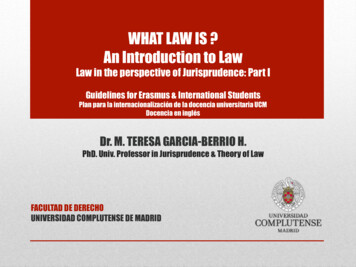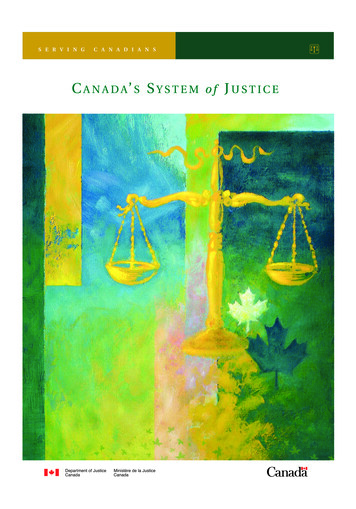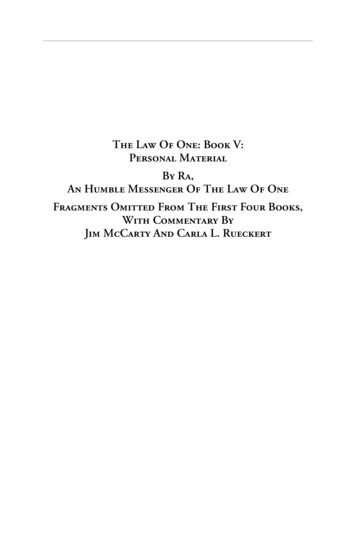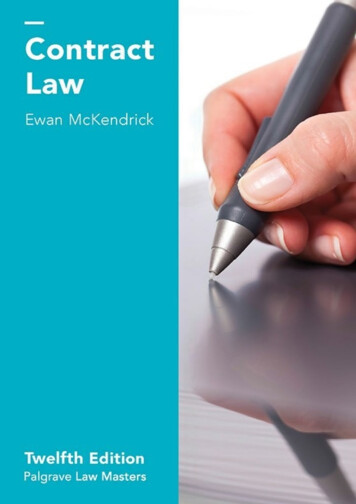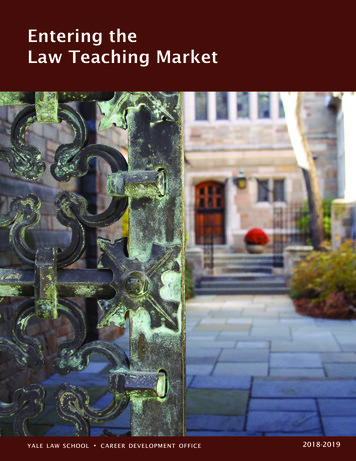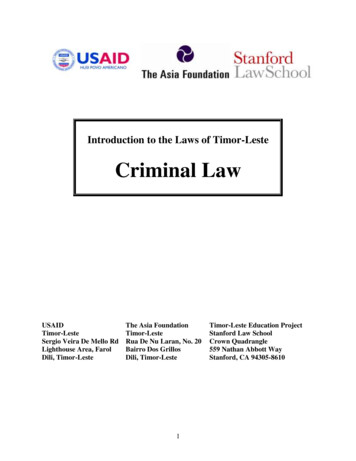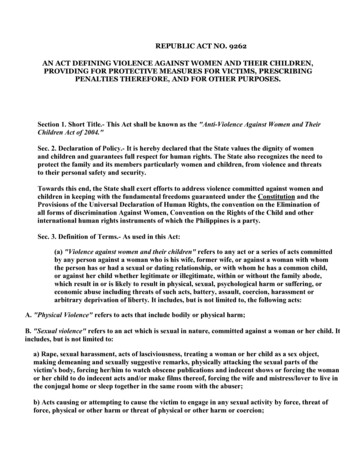
Transcription
REPUBLIC ACT NO. 9262AN ACT DEFINING VIOLENCE AGAINST WOMEN AND THEIR CHILDREN,PROVIDING FOR PROTECTIVE MEASURES FOR VICTIMS, PRESCRIBINGPENALTIES THEREFORE, AND FOR OTHER PURPOSES.Section 1. Short Title.- This Act shall be known as the "Anti-Violence Against Women and TheirChildren Act of 2004."Sec. 2. Declaration of Policy.- It is hereby declared that the State values the dignity of womenand children and guarantees full respect for human rights. The State also recognizes the need toprotect the family and its members particularly women and children, from violence and threatsto their personal safety and security.Towards this end, the State shall exert efforts to address violence committed against women andchildren in keeping with the fundamental freedoms guaranteed under the Constitution and theProvisions of the Universal Declaration of Human Rights, the convention on the Elimination ofall forms of discrimination Against Women, Convention on the Rights of the Child and otherinternational human rights instruments of which the Philippines is a party.Sec. 3. Definition of Terms.- As used in this Act:(a) "Violence against women and their children" refers to any act or a series of acts committedby any person against a woman who is his wife, former wife, or against a woman with whomthe person has or had a sexual or dating relationship, or with whom he has a common child,or against her child whether legitimate or illegitimate, within or without the family abode,which result in or is likely to result in physical, sexual, psychological harm or suffering, oreconomic abuse including threats of such acts, battery, assault, coercion, harassment orarbitrary deprivation of liberty. It includes, but is not limited to, the following acts:A. "Physical Violence" refers to acts that include bodily or physical harm;B. "Sexual violence" refers to an act which is sexual in nature, committed against a woman or her child. Itincludes, but is not limited to:a) Rape, sexual harassment, acts of lasciviousness, treating a woman or her child as a sex object,making demeaning and sexually suggestive remarks, physically attacking the sexual parts of thevictim's body, forcing her/him to watch obscene publications and indecent shows or forcing the womanor her child to do indecent acts and/or make films thereof, forcing the wife and mistress/lover to live inthe conjugal home or sleep together in the same room with the abuser;b) Acts causing or attempting to cause the victim to engage in any sexual activity by force, threat offorce, physical or other harm or threat of physical or other harm or coercion;
c) Prostituting the woman or child.C. "Psychological violence" refers to acts or omissions causing or likely to cause mental or emotionalsuffering of the victim such as but not limited to intimidation, harassment, stalking, damage toproperty, public ridicule or humiliation, repeated verbal abuse and mental infidelity. It includescausing or allowing the victim to witness the physical, sexual or psychological abuse of a member ofthe family to which the victim belongs, or to witness pornography in any form or to witness abusiveinjury to pets or to unlawful or unwanted deprivation of the right to custody and/or visitation ofcommon children.D. "Economic abuse" refers to acts that make or attempt to make a woman financially dependentwhich includes, but is not limited to the following:1. Withdrawal of financial support or preventing the victim from engaging in any legitimate profession,occupation, business or activity, except in cases wherein the other spouse/partner objects on valid, seriousand moral grounds as defined in Article 73 of the Family Code;2. Deprivation or threat of deprivation of financial resources and the right to the use and enjoyment of theconjugal, community or property owned in common;3. Destroying household property;4. Controlling the victims' own money or properties or solely controlling the conjugal money or properties.(b) "Battery" refers to an act of inflicting physical harm upon the woman or her child resulting to the physicaland psychological or emotional distress.(c) "Battered Woman Syndrome" refers to a scientifically defined pattern of psychological and behavioralsymptoms found in women living in battering relationships as a result of cumulative abuse.(d) "Stalking" refers to an intentional act committed by a person who, knowingly and without lawfuljustification follows the woman or her child or places the woman or her child under surveillance directly orindirectly or a combination thereof.(e) "Dating relationship" refers to a situation wherein the parties live as husband and wife without the benefitof marriage or are romantically involved over time and on a continuing basis during the course of therelationship. A casual acquaintance or ordinary socialization between two individuals in a business or socialcontext is not a dating relationship.(f) "Sexual relations" refers to a single sexual act which may or may not result in the bearing of a commonchild.(g) "Safe place or shelter" refers to any home or institution maintained or managed by the Department ofSocial Welfare and Development (DSWD) or by any other agency or voluntary organization accredited by theDSWD for the purposes of this Act or any other suitable place the resident of which is willing temporarily to
receive the victim.(h) "Children" refers to those below eighteen (18) years of age or older but are incapable of taking care ofthemselves as defined under Republic Act No. 7610. As used in this Act, it includes the biological children ofthe victim and other children under her care.Sec. 4. Construction.- This Act shall be liberally construed to promote the protection and safety of victims ofviolence against women and their children.Sec. 5. Acts of Violence Against Women and Their Children.- The crime of violence against women and theirchildren is committed through any of the following acts:(a) Causing physical harm to the woman or her child;(b) Threatening to cause the woman or her child physical harm;(c) Attempting to cause the woman or her child physical harm;(d) Placing the woman or her child in fear of imminent physical harm;(e) Attempting to compel or compelling the woman or her child to engage in conduct which the woman orher child has the right to desist from or desist from conduct which the woman or her child has the right toengage in, or attempting to restrict or restricting the woman's or her child's freedom of movement orconduct by force or threat of force, physical or other harm or threat of physical or other harm, orintimidation directed against the woman or child. This shall include, but not limited to, the following actscommitted with the purpose or effect of controlling or restricting the woman's or her child's movement orconduct:(1) Threatening to deprive or actually depriving the woman or her child of custody to her/his family;(2) Depriving or threatening to deprive the woman or her children of financial support legally due her orher family, or deliberately providing the woman's children insufficient financial support;(3) Depriving or threatening to deprive the woman or her child of a legal right; and(4) Preventing the woman in engaging in any legitimate profession, occupation, business or activity orcontrolling the victim's own mon4ey or properties, or solely controlling the conjugal or common money, orproperties.(f) Inflicting or threatening to inflict physical harm on oneself for the purpose of controlling heractions or decisions;(g) Causing or attempting to cause the woman or her child to engage in any sexual activity whichdoes not constitute rape, by force or threat of force, physical harm, or through intimidation directedagainst the woman or her child or her/his immediate family;
(h) Engaging in purposeful, knowing, or reckless conduct, personally or through another, that alarmsor causes substantial emotional or psychological distress to the woman or her child. This shallinclude, but not be limited to, the following acts:(1) Stalking or following the woman or her child in public or private places;(2) Peering in the window or lingering outside the residence of the woman or her child;(3) Entering or remaining in the dwelling or on the property of the woman or her childagainst her/his will;(4) Destroying the property and personal belongings or inflicting harm to animals or petsof the woman or her child; and(5) Engaging in any form of harassment or violence.(i) Causing mental or emotional anguish, public ridicule or humiliation to the woman or her child,including, but not limited to, repeated verbal and emotional abuse, and denial of financial support orcustody of minor children of access to the woman's child/children.Sec. 6. Penalties.- The crime of violence against women and their children, under Sec. 5 hereof shall be punishedaccording to the following rules:(a) Acts falling under Sec. 5(a) constituting attempted, frustrated or consummated parricide ormurder or homicide shall be punished in accordance with the provisions of the Revised Penal Code;If these acts resulted in mutilation, it shall be punishable in accordance with the Revised PenalCode; those constituting serious physical injuries shall have the penalty of prison mayor; thoseconstituting less serious physical injuries shall be punished by prision correccional; and thoseconstituting slight physical injuries shall be punished by arresto mayor;Acts falling under Sec. 5(b) shall be punished by imprisonment of two degrees lower than theprescribed penalty for the consummated crime as specified in the preceding paragraph but shall inno case be lower than arresto mayor;(b) Acts falling under Sec. 5(c) and 5(d) shall be punished by arresto mayor;(c) Acts falling under Sec. 5(e) shall be punished by prision correccional;(d) Acts falling under Sec. 5(f) shall be punished by arresto mayor;(e) Acts falling under Sec. 5(g) shall be punished by prision mayor;(f) Acts falling under Sec. 5(h) and Sec. 5(i) shall be punished by prision mayor.If the acts are committed while the woman or child is pregnant or committed in the presence of her child, the
penalty to be applied shall be the maximum period of penalty prescribed in the Sec.In addition to imprisonment, the perpetrator shall (a) pay a fine in the amount of not less than One hundredthousand pesos (P100,000.00) but not more than three hundred thousand pesos (300,000.00); (b) undergomandatory psychological counseling or psychiatric treatment and shall report compliance to the court.Sec. 7. Venue.- The Regional Trial Court designated as a Family Court shall have original and exclusivejurisdiction over cases of violence against women and their children under this law. In the absence of suchcourt in the place where the offense was committed, the case shall be filed in the Regional Trial Court wherethe crime or any of its elements was committed at the option of the compliant.Sec. 8. Protection Orders.- A protection order is an order issued under this act for the purpose of preventingfurther acts of violence against a woman or her child specified in Sec. 5 of this Act and granting othernecessary relief. The relief granted under a protection order serve the purpose of safeguarding the victimfrom further harm, minimizing any disruption in the victim's daily life, and facilitating the opportunity andability of the victim to independently regain control over her life. The provisions of the protection order shallbe enforced by law enforcement agencies. The protection orders that may be issued under this Act are thebarangay protection order (BPO), temporary protection order (TPO) and permanent protection order (PPO).The protection orders that may be issued under this Act shall include any, some or all of the following reliefs:(a) Prohibition of the respondent from threatening to commit or committing, personally or through another,any of the acts mentioned in Sec. 5 of this Act;(b) Prohibition of the respondent from harassing, annoying, telephoning, contacting or otherwisecommunicating with the petitioner, directly or indirectly;(c) Removal and exclusion of the respondent from the residence of the petitioner, regardless of ownership ofthe residence, either temporarily for the purpose of protecting the petitioner, or permanently where noproperty rights are violated, and if respondent must remove personal effects from the residence, the courtshall direct a law enforcement agent to accompany the respondent has gathered his things and escortrespondent from the residence;(d) Directing the respondent to stay away from petitioner and designated family or household member at adistance specified by the court, and to stay away from the residence, school, place of employment, or anyspecified place frequented by the petitioner and any designated family or household member;(e) Directing lawful possession and use by petitioner of an automobile and other essential personal effects,regardless of ownership, and directing the appropriate law enforcement officer to accompany the petitionerto the residence of the parties to ensure that the petitioner is safely restored to the possession of theautomobile and other essential personal effects, or to supervise the petitioner's or respondent's removal ofpersonal belongings;(f) Granting a temporary or permanent custody of a child/children to the petitioner;(g) Directing the respondent to provide support to the woman and/or her child if entitled to legal support.Notwithstanding other laws to the contrary, the court shall order an appropriate percentage of the income
or salary of the respondent to be withheld regularly by the respondent's employer for the same to beautomatically remitted directly to the woman. Failure to remit and/or withhold or any delay in theremittance of support to the woman and/or her child without justifiable cause shall render the respondentor his employer liable for indirect contempt of court;(h) Prohibition of the respondent from any use or possession of any firearm or deadly weapon and orderhim to surrender the same to the court for appropriate disposition by the court, including revocation oflicense and disqualification to apply for any license to use or possess a firearm. If the offender is a lawenforcement agent, the court shall order the offender to surrender his firearm and shall direct theappropriate authority to investigate on the offender and take appropriate action on matter;(i) Restitution for actual damages caused by the violence inflicted, including, but not limited to, propertydamage, medical expenses, childcare expenses and loss of income;(j) Directing the DSWD or any appropriate agency to provide petitioner may need; and(k) Provision of such other forms of relief as the court deems necessary to protect and provide for the safetyof the petitioner and any designated family or household member, provided petitioner and any designatedfamily or household member consents to such relief.Any of the reliefs provided under this Sec. shall be granted even in the absence of a decree of legalseparation or annulment or declaration of absolute nullity of marriage.The issuance of a BPO or the pendency of an application for BPO shall not preclude a petitioner fromapplying for, or the court from granting a TPO or PPO.Sec. 9. Who may file Petition for Protection Orders. – A petition for protection order may be filed by anyof the following:(a) The offended party;(b) Parents or guardians of the offended party;(c) Ascendants, descendants or collateral relatives within the fourth civil degree of consanguinity oraffinity;(d) Officers or social workers of the DSWD or social workers of local government units (LGUs);(e) Police officers, preferably those in charge of women and children's desks;(f) Punong Barangay or Barangay Kagawad;(g) Lawyer, counselor, therapist or healthcare provider of the petitioner;(h) At least two (2) concerned responsible citizens of the city or municipality where the violence against
women and their children occurred and who has personal knowledge of the offense committed.Sec. 10. Where to Apply for a Protection Order. – Applications for BPOs shall follow the rules on venueunder Sec. 409 of the Local Government Code of 1991 and its implementing rules and regulations. Anapplication for a TPO or PPO may be filed in the regional trial court, metropolitan trial court, municipal trialcourt, municipal circuit trial court with territorial jurisdiction over the place of residence of the petitioner:Provided, however, That if a family court exists in the place of residence of the petitioner, the applicationshall be filed with that court.Sec. 11. How to Apply for a Protection Order. – The application for a protection order must be in writing,signed and verified under oath by the applicant. It may be filed as an independent action or as incidentalrelief in any civil or criminal case the subject matter or issues thereof partakes of a violence as described inthis Act. A standard protection order application form, written in English with translation to the major locallanguages, shall be made available to facilitate applications for protections order, and shall contain, amongother, the following information:(a) names and addresses of petitioner and respondent;(b) description of relationships between petitioner and respondent;(c) a statement of the circumstances of the abuse;(d) description of the reliefs requested by petitioner as specified in Sec. 8 herein;(e) request for counsel and reasons for such;(f) request for waiver of application fees until hearing; and(g) an attestation that there is no pending application for a protection order in another court.If the applicants is not the victim, the application must be accompanied by an affidavit of the applicantattesting to (a) the circumstances of the abuse suffered by the victim and (b) the circumstances of consentgiven by the victim for the filling of the application. When disclosure of the address of the victim will posedanger to her life, it shall be so stated in the application. In such a case, the applicant shall attest that thevictim is residing in the municipality or city over which court has territorial jurisdiction, and shall providea mailing address for purpose of service processing.An application for protection order filed with a court shall be considered an application for both a TPOand PPO.Barangay officials and court personnel shall assist applicants in the preparation of the application. Lawenforcement agents shall also extend assistance in the application for protection orders in cases brought totheir attention.Sec. 12. Enforceability of Protection Orders. – All TPOs and PPOs issued under this Act shall beenforceable anywhere in the Philippines and a violation thereof shall be punishable with a fine ranging
from Five Thousand Pesos (P5,000.00) to Fifty Thousand Pesos (P50,000.00) and/or imprisonment of six (6)months.Sec. 13. Legal Representation of Petitioners for Protection Order. – If the woman or her child requests inthe applications for a protection order for the appointment of counsel because of lack of economic meansto hire a counsel de parte, the court shall immediately direct the Public Attorney's Office (PAO) torepresent the petitioner in the hearing on the application. If the PAO determines that the applicant canafford to hire the services of a counsel de parte, it shall facilitate the legal representation of the petitionerby a counsel de parte. The lack of access to family or conjugal resources by the applicant, such as when thesame are controlled by the perpetrator, shall qualify the petitioner to legal representation by the PAO.However, a private counsel offering free legal service is not barred from representing the petitioner.Sec. 14. Barangay Protection Orders (BPOs); Who May Issue and How. - Barangay Protection Orders(BPOs) refer to the protection order issued by the Punong Barangay ordering the perpetrator to desistfrom committing acts under Sec. 5 (a) and (b) of this Act. A Punong Barangay who receives applicationsfor a BPO shall issue the protection order to the applicant on the date of filing after ex parte determinationof the basis of the application. If the Punong Barangay is unavailable to act on the application for a BPO,the application shall be acted upon by any available Barangay Kagawad. If the BPO is issued by aBarangay Kagawad the order must be accompanied by an attestation by the Barangay Kagawad that thePunong Barangay was unavailable at the time for the issuance of the BPO. BPOs shall be effective forfifteen (15) days. Immediately after the issuance of an ex parte BPO, the Punong Barangay or BarangayKagawad shall personally serve a copy of the same on the respondent, or direct any barangay official toeffect is personal service.The parties may be accompanied by a non-lawyer advocate in any proceeding before the PunongBarangay.Sec. 15. Temporary Protection Orders. – Temporary Protection Orders (TPOs) refers to the protectionorder issued by the court on the date of filing of the application after ex parte determination that suchorder should be issued. A court may grant in a TPO any, some or all of the reliefs mentioned in this Actand shall be effective for thirty (30) days. The court shall schedule a hearing on the issuance of a PPO priorto or on the date of the expiration of the TPO. The court shall order the immediate personal service of theTPO on the respondent by the court sheriff who may obtain the assistance of law enforcement agents forthe service. The TPO shall include notice of the date of the hearing on the merits of the issuance of a PPO.Sec. 16. Permanent Protection Orders. – Permanent Protection Order (PPO) refers to protection orderissued by the court after notice and hearing.Respondents non-appearance despite proper notice, or his lack of a lawyer, or the non-availability of hislawyer shall not be a ground for rescheduling or postponing the hearing on the merits of the issuance of aPPO. If the respondents appears without counsel on the date of the hearing on the PPO, the court shallappoint a lawyer for the respondent and immediately proceed with the hearing. In case the respondentfails to appear despite proper notice, the court shall allow ex parte presentation of the evidence by theapplicant and render judgment on the basis of the evidence presented. The court shall allow theintroduction of any history of abusive conduct of a respondent even if the same was not directed against
the applicant or the person for whom the applicant is made.The court shall, to the extent possible, conduct the hearing on the merits of the issuance of a PPO in one (1)day. Where the court is unable to conduct the hearing within one (1) day and the TPO issued is due toexpire, the court shall continuously extend or renew the TPO for a period of thirty (30) days at eachparticular time until final judgment is issued. The extended or renewed TPO may be modified by the courtas may be necessary or applicable to address the needs of the applicant.The court may grant any, some or all of the reliefs specified in Sec. 8 hereof in a PPO. A PPO shall beeffective until revoked by a court upon application of the person in whose favor the order was issued. Thecourt shall ensure immediate personal service of the PPO on respondent.The court shall not deny the issuance of protection order on the basis of the lapse of time between the act ofviolence and the filing of the application.Regardless of the conviction or acquittal of the respondent, the Court must determine whether or not thePPO shall become final. Even in a dismissal, a PPO shall be granted as long as there is no clear showingthat the act from which the order might arise did not exist.Sec. 17. Notice of Sanction in Protection Orders. – The following statement must be printed in bold-facedtype or in capital letters on the protection order issued by the Punong Barangay or court:"VIOLATION OF THIS ORDER IS PUNISHABLE BY LAW."Sec. 18. Mandatory Period For Acting on Applications For Protection Orders – Failure to act on anapplication for a protection order within the reglementary period specified in the previous Sec. withoutjustifiable cause shall render the official or judge administratively liable.Sec. 19. Legal Separation Cases. – In cases of legal separation, where violence as specified in this Act isalleged, Article 58 of the Family Code shall not apply. The court shall proceed on the main case and otherincidents of the case as soon as possible. The hearing on any application for a protection order filed by thepetitioner must be conducted within the mandatory period specified in this Act.Sec. 20. Priority of Application for a Protection Order. – Ex parte and adversarial hearings to determine thebasis of applications for a protection order under this Act shall have priority over all other proceedings.Barangay officials and the courts shall schedule and conduct hearings on applications for a protection orderunder this Act above all other business and, if necessary, suspend other proceedings in order to hearapplications for a protection order.Sec. 21. Violation of Protection Orders. – A complaint for a violation of a BPO issued under this Act must befiled directly with any municipal trial court, metropolitan trial court, or municipal circuit trial court thathas territorial jurisdiction over the barangay that issued the BPO. Violation of a BPO shall be punishable byimprisonment of thirty (30) days without prejudice to any other criminal or civil action that the offendedparty may file for any of the acts committed.A judgement of violation of a BPO ma be appealed according to the Rules of Court. During trial and upon
judgment, the trial court may motu proprio issue a protection order as it deems necessary without need ofan application.Violation of any provision of a TPO or PPO issued under this Act shall constitute contempt of courtpunishable under Rule 71 of the Rules of Court, without prejudice to any other criminal or civil action thatthe offended party may file for any of the acts committed.Sec. 22. Applicability of Protection Orders to Criminal Cases. – The foregoing provisions on protectionorders shall be applicable in impliedly instituted with the criminal actions involving violence against womenand their children.Sec. 23. Bond to Keep the Peace. – The Court may order any person against whom a protection order isissued to give a bond to keep the peace, to present two sufficient sureties who shall undertake that suchperson will not commit the violence sought to be prevented.Should the respondent fail to give the bond as required, he shall be detained for a period which shall in nocase exceed six (6) months, if he shall have been prosecuted for acts punishable under Sec. 5(a) to 5(f) andnot exceeding thirty (30) days, if for acts punishable under Sec. 5(g) to 5(i).The protection orders referred to in this Sec. are the TPOs and the PPOs issued only by the courts.Sec. 24. Prescriptive Period. – Acts falling under Sec.s 5(a) to 5(f) shall prescribe in twenty (20) years. Actsfalling under Sec.s 5(g) to 5(i) shall prescribe in ten (10) years.Sec. 25. Public Crime. – Violence against women and their children shall be considered a public offensewhich may be prosecuted upon the filing of a complaint by any citizen having personal knowledge of thecircumstances involving the commission of the crime.Sec. 26. Battered Woman Syndrome as a Defense. – Victim-survivors who are found by the courts to besuffering from battered woman syndrome do not incur any criminal and civil liability notwithstanding theabsence of any of the elements for justifying circumstances of self-defense under the Revised Penal Code.In the determination of the state of mind of the woman who was suffering from battered woman syndromeat the time of the commission of the crime, the courts shall be assisted by expert psychiatrists/ psychologists.Sec. 27. Prohibited Defense. – Being under the influence of alcohol, any illicit drug, or any other mindaltering substance shall not be a defense under this Act.Sec. 28. Custody of children. – The woman victim of violence shall be entitled to the custody and support ofher child/children. Children below seven (7) years old older but with mental or physical disabilities shallautomatically be given to the mother, with right to support, unless the court finds compelling reasons toorder otherwise.A victim who is suffering from battered woman syndrome shall not be disqualified from having custody ofher children. In no case shall custody of minor children be given to the perpetrator of a woman who issuffering from Battered woman syndrome.
Sec. 29. Duties of Prosecutors/Court Personnel. – Prosecutors and court personnel should observe thefollowing duties when dealing with victims under this Act:a) communicate with the victim in a language understood by the woman or her child; andb) inform the victim of her/his rights including legal remedies available and procedure, and privileges forindigent litigants.Sec. 30. Duties of Barangay Officials and Law Enforcers. – Barangay officials and law enforcers shallhave the following duties:(a) respond immediately to a call for help or request for assistance or protection of the victim byentering the necessary whether or not a protection order has been issued and ensure the safety ofthe victim/s;(b) confiscate any deadly weapon in the possession of the perpetrator or within plain view;(c) transport or escort the victim/s to a safe place of their choice or to a clinic or hospital;(d) assist the victim in removing personal belongs from the house;(e) assist the barangay officials and other government officers and employees who respond to a callfor help;(f) ensure the enforcement of the Protection Orders issued by the Punong Barangy or the courts;(g) arrest the suspected perpetrator wiithout a warrant when any of the acts of
receive the victim. (h) "Children" refers to those below eighteen (18) years of age or older but are incapable of taking care of themselves as defined under Republic Act No. 7610. As used in this Act, it includes the biological children of the victim and other children under her care.




